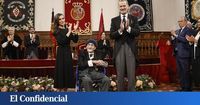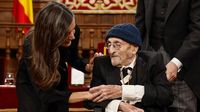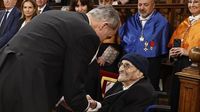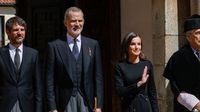On April 23, 2025, the prestigious Miguel de Cervantes Prize was awarded to Álvaro Pombo, an esteemed Spanish author, in a ceremony held at the University of Alcalá de Henares. This event coincided with World Book Day, a fitting backdrop for honoring one of the great literary figures of the Spanish language. Pombo, who is 85 years old and arrived in a wheelchair, was accompanied by King Felipe VI and Queen Letizia, both dressed in mourning attire due to the recent death of Pope Francis.
Pombo, known for his lyrical prowess and insightful narratives, expressed profound gratitude for receiving this honor, stating, "This honor is the highest literary and social recognition that Spain or the world has ever granted me. I feel highly recognized, accepted, and admired, much more than I deserve." His speech, titled "Una fenomenología de la fragilidad," was read by his friend and historian Mario Crespo, as Pombo's health prevented him from delivering it himself.
In his speech, Pombo emphasized the theme of fragility, a concept he believes is central to the human experience. He stated, "Today, it remains perhaps more than ever the great theme: fragility in the face of illness, solitude, injustice, insecurity, lack of convictions, and lost causes." Pombo's reflections touched on the fragility of Spain itself, drawing parallels to historical events such as the disaster of Annual, where Spanish forces faced a catastrophic defeat.
"The fragility of Spain leads us once again to raise a chapel to Santiago Matamoros, only to have the Moors kill Spaniards in Santiago Matamoros. Now, no one fights for their honor or Spain's honor anymore. We have become influencers and merchants," he remarked, highlighting a shift in societal values.
Pombo's speech also drew upon the works of Miguel de Cervantes, particularly referencing "Don Quijote de la Mancha" and "El licenciado Vidriera." He articulated the notion that the narrative of fragility does not need to be a fragile or breakable one, but can be as unyielding as Cervantes' texts. He quoted Cervantes, saying, "Dios lo remedie; que todo este mundo es máquinas y trazas, contrarias unas de otras. Yo no puedo más," reflecting on the complexities of life.
Throughout his address, Pombo compared the fragility of human existence to the fragility of glass, stating, "Glass is the breakable, the fragile, the opposite of El Escorial, the opposite of victory. Who speaks of victories? Overcoming is everything; coming out successfully is everything." This metaphor resonated deeply with the audience, as it encapsulated the essence of his message.
King Felipe VI, in his remarks, praised Pombo's commitment to goodness and truth, stating, "In the times we live in, the values of clarity, goodness, and truth are like beacons that must guide us in an incessant search." He noted Pombo's literary works often explore the contrast between good and evil, emphasizing the importance of moral integrity in literature.
The Minister of Culture, Ernest Urtasun, opened the ceremony with a tribute to Mario Vargas Llosa, who received the Cervantes Prize in 1994. Urtasun described Pombo as an "eccentric author" whose narratives are infused with a metaphysical mission that resonates with readers. He acknowledged Pombo's significant contributions to literature, highlighting his ability to create a unique literary world that engages and moves audiences.
As the ceremony progressed, Pombo was visibly emotional, receiving the prize from King Felipe VI, who assisted him in holding the award. The moment was poignant, symbolizing not just the recognition of Pombo's literary achievements but also his resilience in facing health challenges.
In his closing remarks, Pombo reflected on the need for depth and humility to achieve greatness in Spain, suggesting that overcoming fragility requires confronting deeper issues within society. He concluded with a hopeful message: "It is very possible that to achieve greatness in Spain, to overcome fragility, we all must reach depth and poverty. There, the enchantments will dissolve. There, the glass will finally break. There, the fragile will become strong. And heroes will continue to traverse the empire of their incessant words."
The Cervantes Prize, endowed with 125,000 euros, is the highest honor for Spanish literature, recognizing authors who have made significant contributions to the literary landscape. Pombo joins a distinguished list of previous winners, including Vargas Llosa, Ida Vitale, and Elena Poniatowska.
Following the ceremony, Pombo is set to inaugurate a continuous reading of "Don Quijote" later in the day, further celebrating the legacy of Cervantes. The event will also feature an exhibition titled "Álvaro Pombo. Una narrativa de la fragilidad," co-organized by the General Directorate of Books, Comics, and Reading and the University of Alcalá, which will pay homage to Pombo's literary journey.
This year's ceremony was marked not only by the celebration of literary excellence but also by a somber acknowledgment of loss and the fragility of life, themes that resonate deeply in Pombo's work and the current societal landscape.









